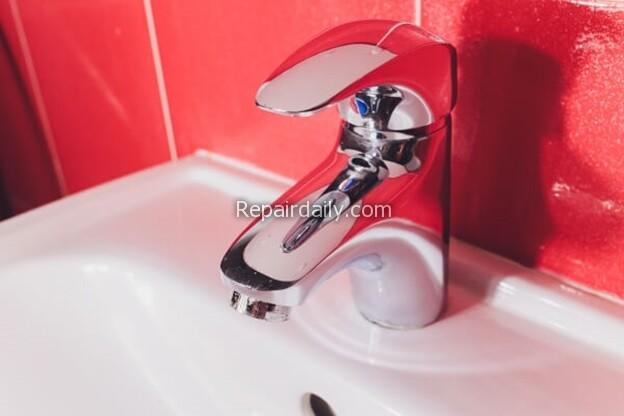

basin tap
Hard water is one of the most common afflictions in the USA. Statistically speaking, there are over 80% of all households that have to deal with this issue on a constant basis.
Now here’s the thing: depending on hardness levels, you might not even notice that you have this problem. However, in time, it becomes noticeable. Your showerhead and faucet’s opening become engrained with hard minerals. Bathroom tiles, kettles, and basically any other thing that comes often in direct contact with water suffer the same thing.
Believe it not but hard water is also responsible for a substantial number of annual boiler breakdowns. Limescale deposits have a tendency to buildup on a component called the heat exchanger, leading to it overheating. Gradually this can lead to the development of cracks and eventually complete degeneration of the part. As this heating blog mentions, limescale inhibitors can be a great way to prevent hard water and limescale every getting the chance to cause damage to your heating system.
But the biggest problem by far is having your water ducts clogged by limescale. It won’t happen overnight, but even the smallest amount of water hardness will eventually cost you dearly. To avoid this, you will need to put in some effort and even invest a small amount of money to avoid disastrous bills in the future. We will be talking about how to remove existing limescale, and what preventive measures you can take.
How to Remove Existing Limescale Deposits Caused by Hard Water
For most intents and purposes, you will need some white vinegar and some lemons. Limescale deposits quickly wash away once they come in contact with mild acids like the previously two mentioned products.
Let’s start with the areas affected the most:
Tiles and bathroom fittings.
For this, you should pour half vinegar and half water in a spray bottle. Shake the container and spray the mixture everywhere there are limescale deposits. Do this regularly after a shower to avoid future limescale buildup. And don’t forget to rinse away with regular water afterwards.
If tiles and other fixtures have a major limescale buildup, you will need a slightly different approach. You’ll need to soak a clean towel in the vinegar and water solution, and leave the towel wrapped around said fixtures overnight. In the morning, unwrap the towel and scrub to remove remaining buildup, then rinse to wash away the smell.
Warning! Don’t use this method if you have gold plated taps, as the acid in the vinegar can damage the finish.



turbulent-electric-heater-covered-with-coating-hard-water
Dishwashers and washing machines
Luckily, for washing machines, the process is relatively simple. All you need to do is pour a large cup of vinegar or lemon juice where you would usually place the detergent. For dishwashers, place the large cup of vinegar into the appliance’s base.
Next, just run the regular wash cycle without inserting any clothes, dishes, or detergent. Let it do its thing, and the appliance should be running smoothly once again. Alternatively, you could also get descaling solutions for these types of machines and use them every time you want to wash a load of clothes or dishes.
Showerheads and toilets
Use the same half water and half vinegar solution that you’ve previously used for tiles and fittings.
Except, this time, you will also need a large bowl in which to soak the showerhead. Leave it there for a few hours, preferably overnight. Once done, rinse with plain water.
For toilets, pour the solution on the affected areas and scrub thoroughly with a toilet brush. You may have to repeat this process several times to get the desired effect.
How to Prevent Limescale
Removing limescale can be a bit difficult at times. Why bother removing it when you could prevent it altogether?
People in the past have relied on salt-based water softeners to achieve this exact goal. However, in the meantime, water softeners have seen bans and regulations in several states. So what’s the solution?
One alternative that caught our attention was a water descaler. It works by sending electronic capacitive signals inside the pipe, thus reshaping calcium and magnesium crystals. In short, it softens the water without altering its structure or adding any unwanted chemicals.
There are other alternatives as well, such as template assisted crystallization and reverse osmosis systems, but those are harder to maintain. Overall, we’re pretty sure that a water descaler should fit your needs quite well without requiring much plumbing knowledge or hassle with maintenance.
Final Thoughts
Any of these limescale elimination methods work to a certain extent. However, the best approach would be to prevent it altogether and save more money down the line by buying a new boiler.
Have you tried any of these methods in the past? How did they work? Feel free to leave us a comment down below and share your thoughts with the rest of our community.
I'm so excited to tackle all my home improvement projects! From plumbing to DIY and cleaning - I'm ready to get down to work! #homerepair #homecleaning #plumbing #diy #fixerupper #realestate #renovation #interiordesign #farmhouse #diy #homedecor #hgtv #home #farmhousedecor #modernfarmhouse #farmhousestyle #fixerupperstyle #fixandflip #homerenovation #realestateinvesting #beforeandafter #homesweethome #remodel #realestateinvestor #interior #realtor #joannagaines #flippinghouses #countryliving #design #homedesign #farmhouseinspired #investmentproperty #bhghome #renovationproject #farmhousekitchen #homeimprovement #farmhouseliving #cottagestyle #decor #realestateagent #magnoliahome #homeinspo #magnoliamarket #kitchendesign #dreamhome #shiplap #construction #houseflipping #investor #farmhousedesign #architecture #farmhousechic #homereno #rusticdecor #reno #kitchenremodel #webuyhouses #magnoliatable #rentalproperty #fixerupperinspired #newhome #interiors #homeremodel

